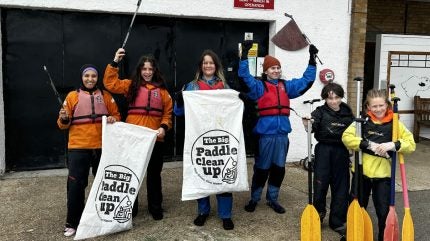
The Big Paddle Clean-up, an environmental campaign organised by the national paddlesports governing body Paddle UK, will run from 25 May to 9 June 2024.
The paddling community will collect waste from rivers, canals, estuaries, reservoirs and lakes across the UK. More than 1,400 clean-up kits have already been issued.
In 2023, more than 2,600 paddlers took part in a bid to raise public awareness of marine pollution.
1,800 huge sacks were filled and found to contain 6,767 plastic bottles, 2,739 glass bottles, 4,403 cans and 7,682 food packaging items.
According to Paddle UK, the winter storms and wet spring in 2024 mean more discarded packaging in waterways and hidden along banks.
The Big Plastic Count, the UK’s largest household plastic waste survey, recently found that the country’s households discard an estimated 90 billion pieces of plastic packaging per year.
Paddle UK access and environmental lead Chantelle Grundy commented: “Many of our waterways are kept clean by dedicated volunteers committed to giving their time for the benefit of nature and people. We’re highlighting the challenges our waterways face from plastic pollution and hope it will inspire change to protect all of our waters for future generations.”
In 2022, Paddle UK was shortlisted at the inaugural BBC Sport Green Awards which celebrates global sustainability champions.
GlobalData’s ESG [environmental, social and governance] 2.0 report flagged water pollution as a major problem, noting that “plastic contamination has reached dangerous levels: one in three fish caught for human consumption now contains some form of plastic.”



